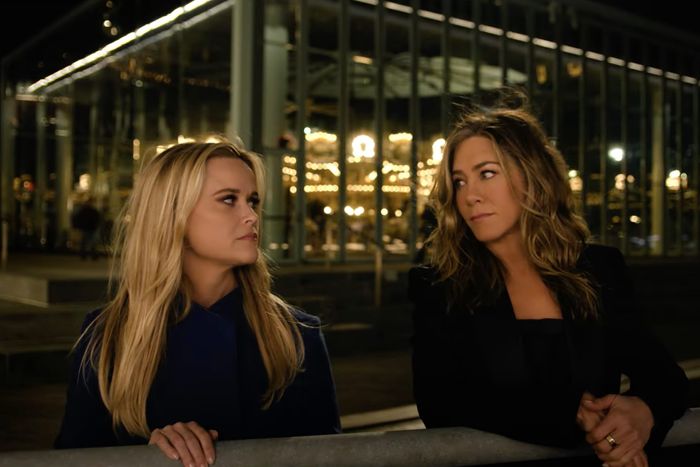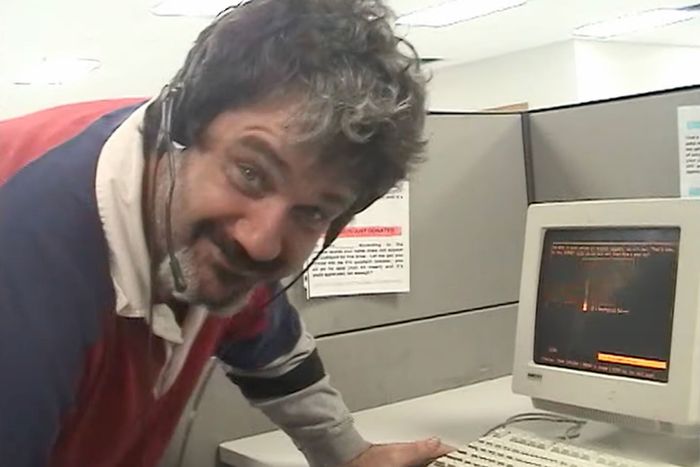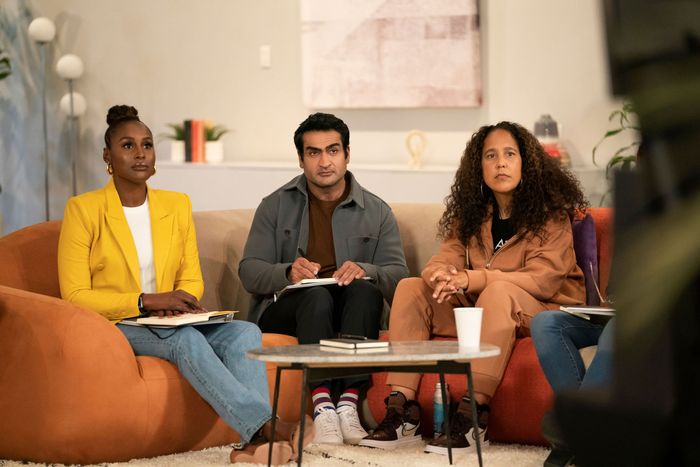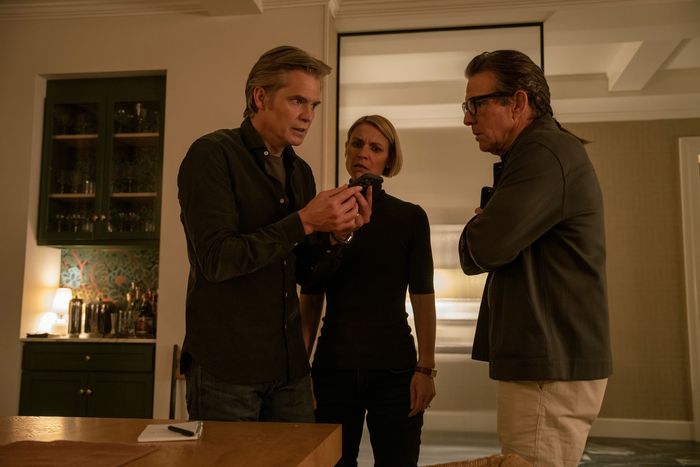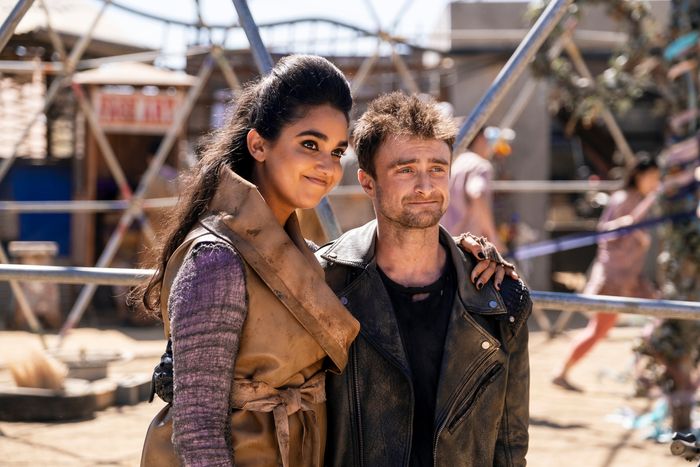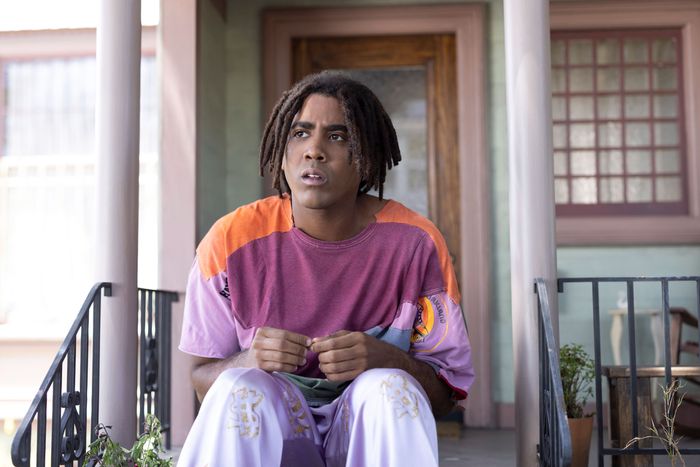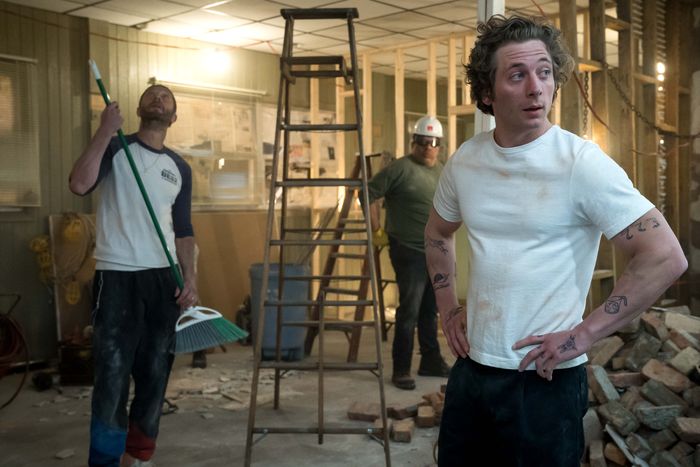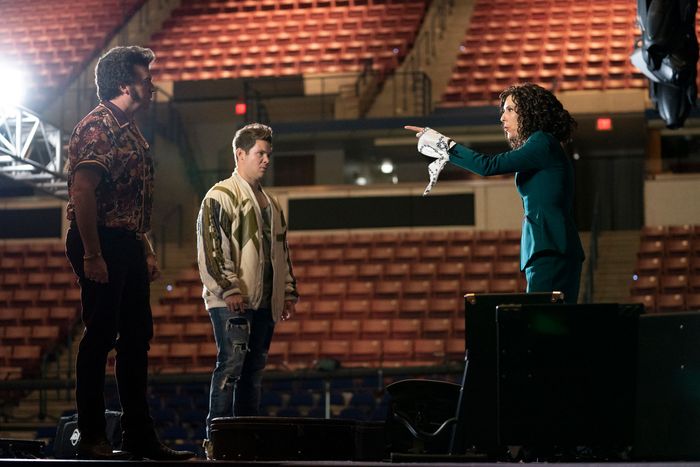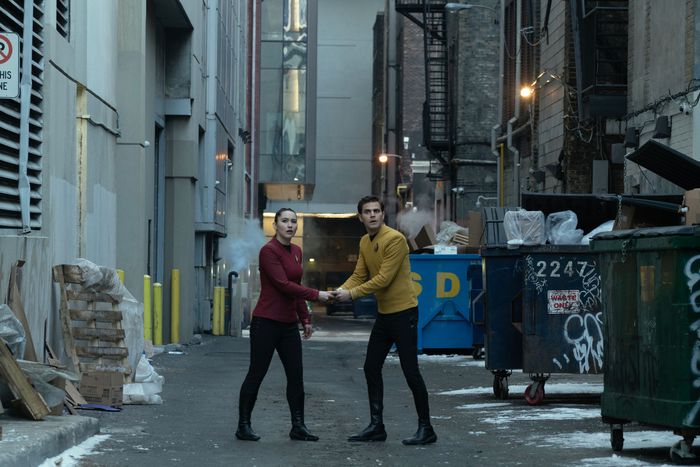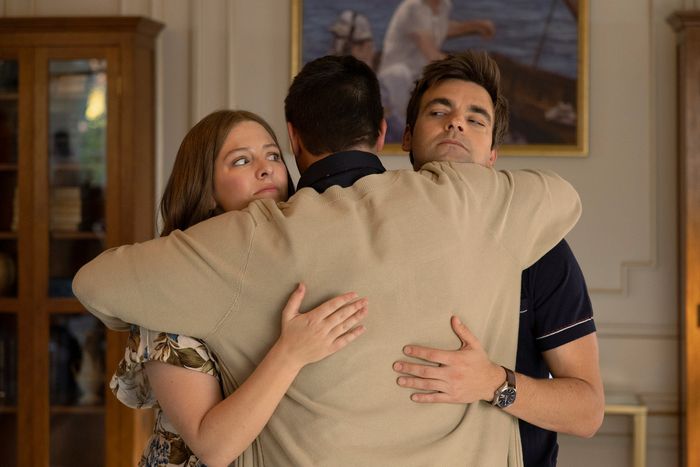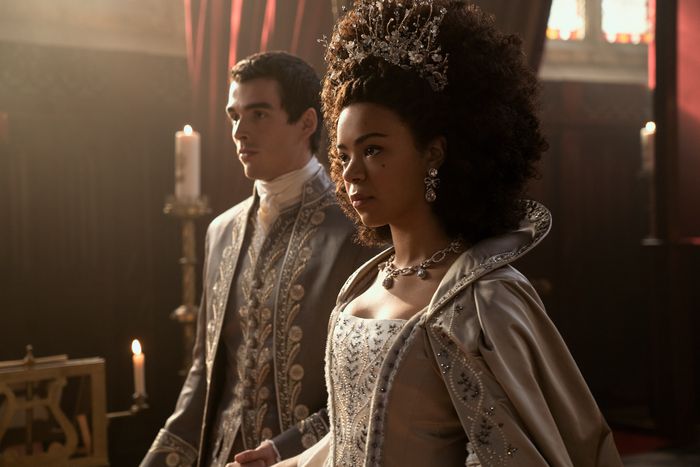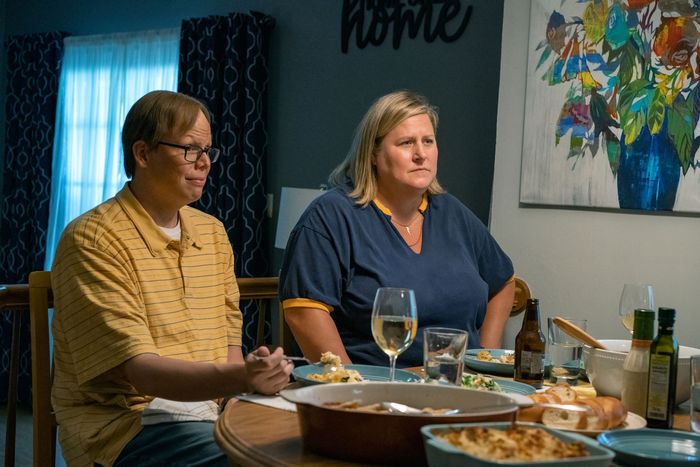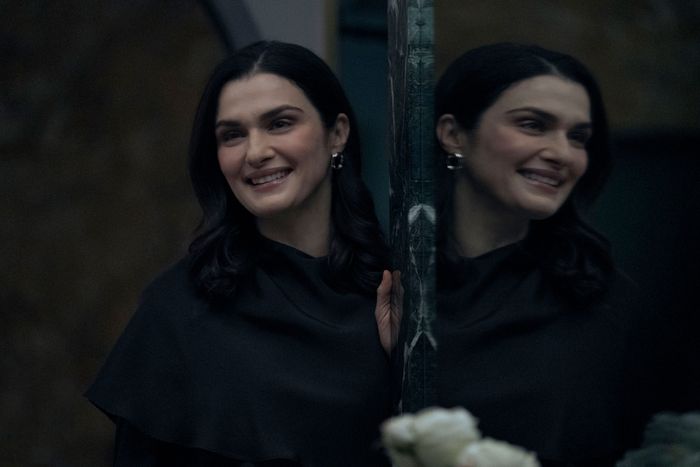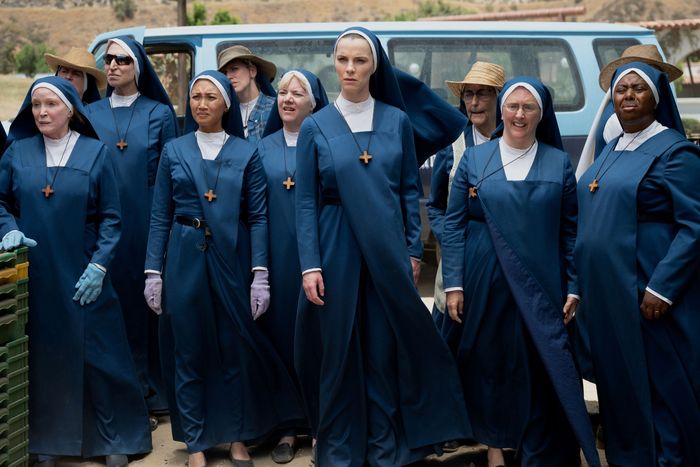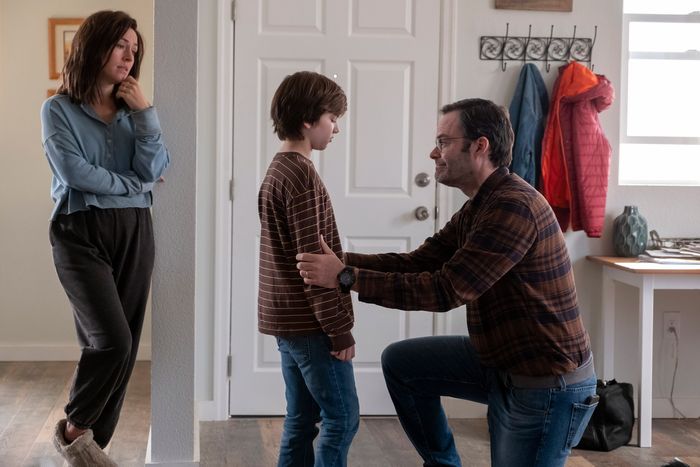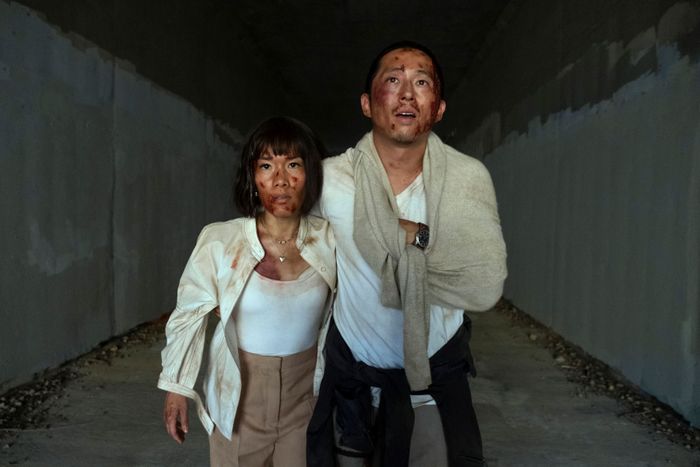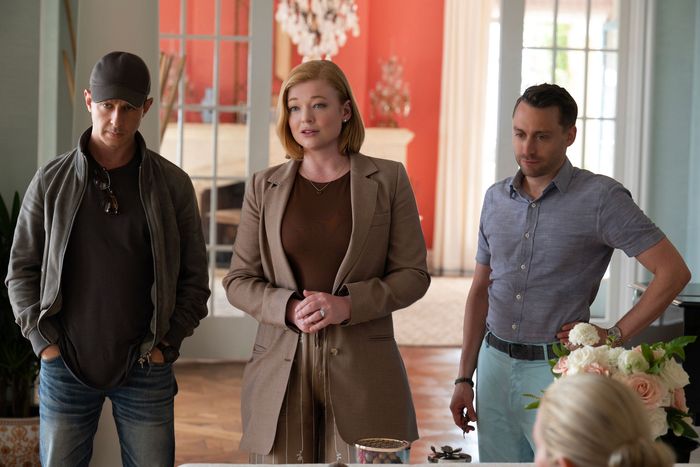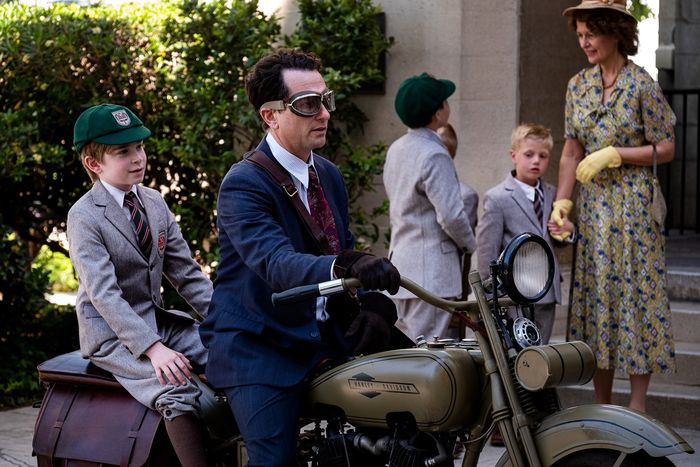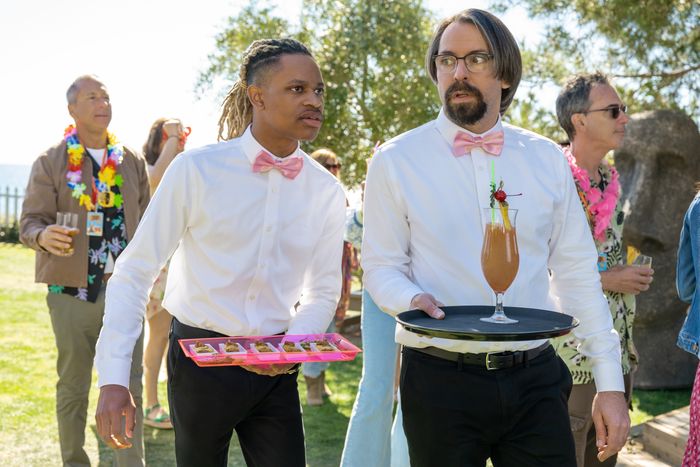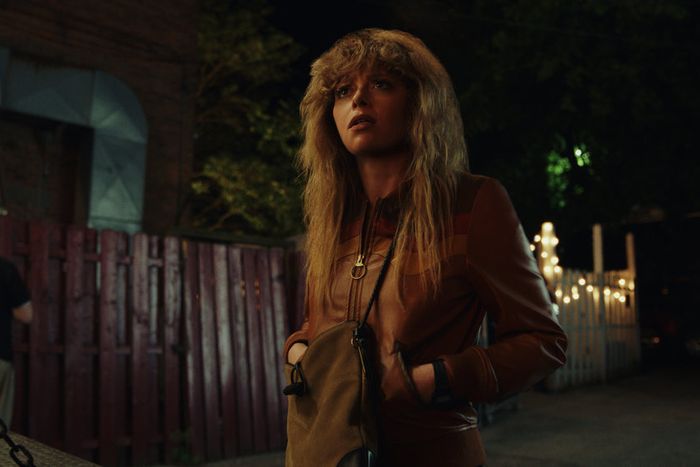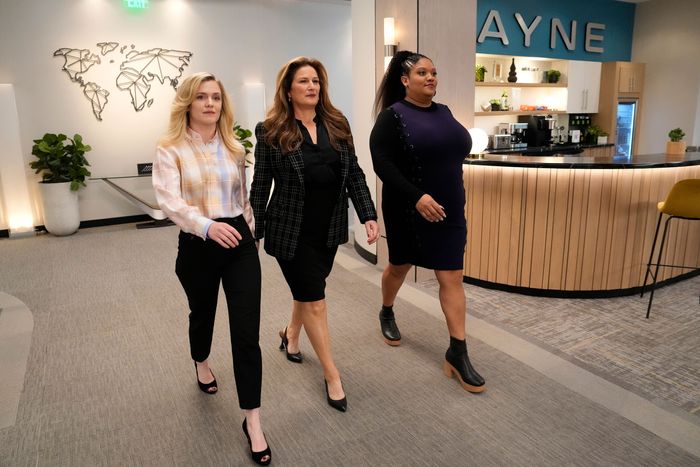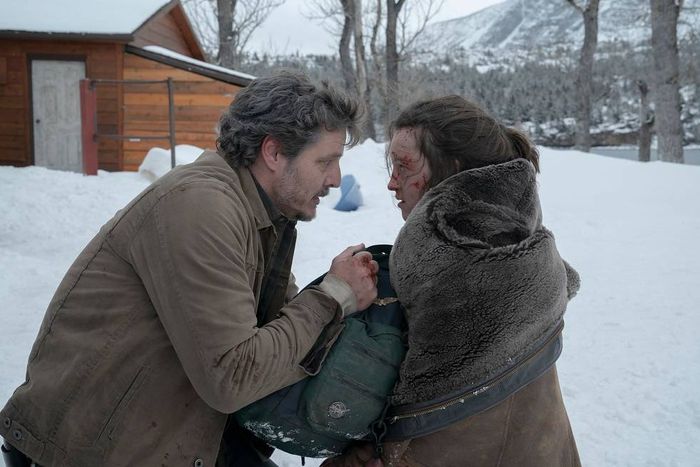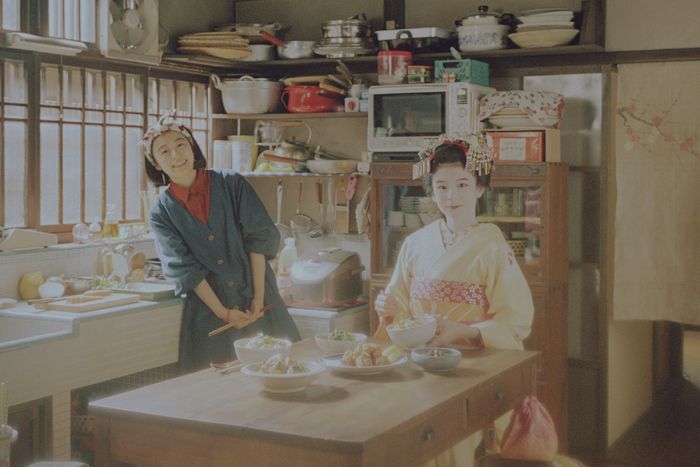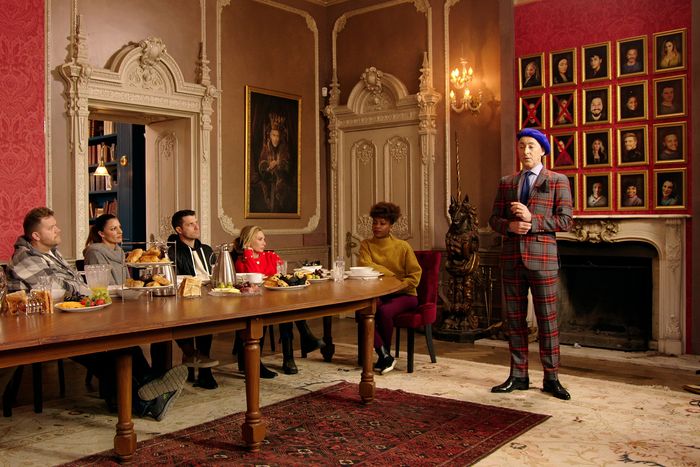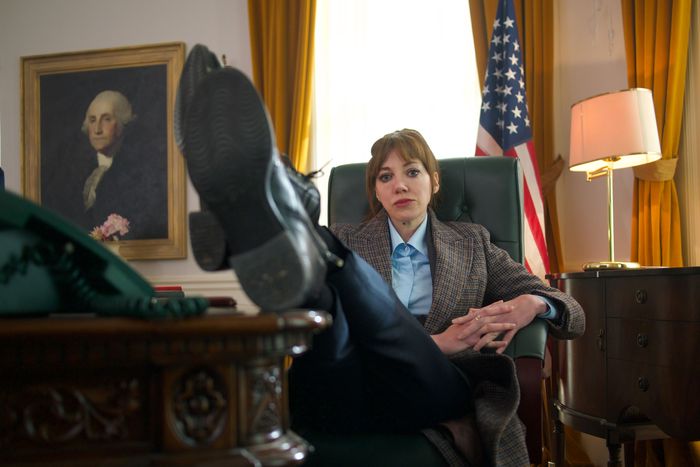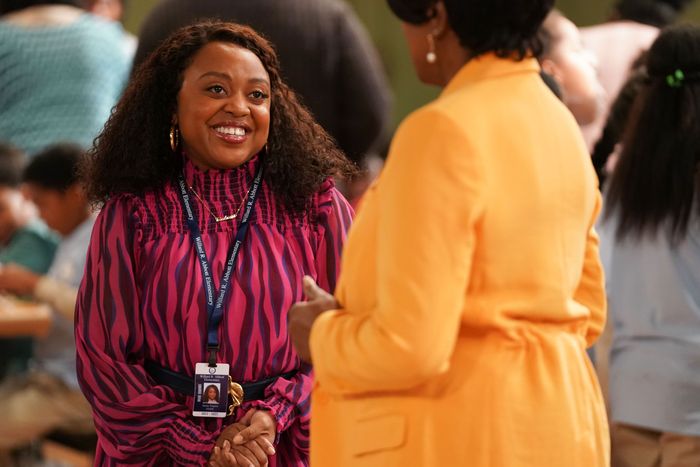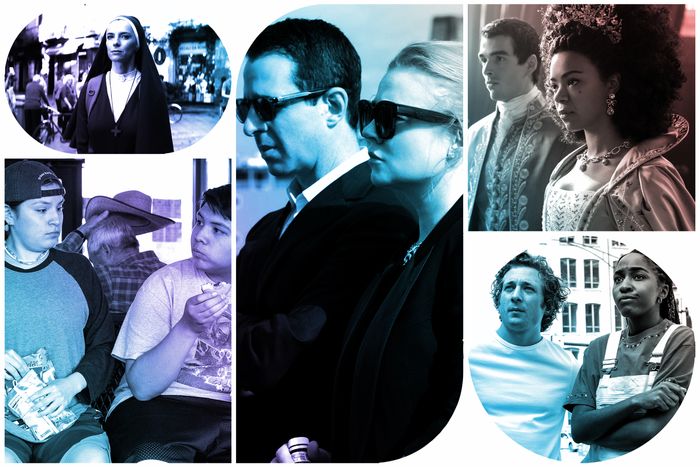
We are now deep into TV’s post-peak era, and the future of the medium looks murky at best. Frankly, it’s a mess out there in TV Land, but a silver lining to this chaos is that it has widened the scope of what’s considered a “great” series. Yes, prestige-drama reboots and multiverse-spanning franchise installments will probably always be with us (and even occasionally worthwhile!), but some of the most exciting TV out there right now defies easy classification, embraces or puts a new spin on classic formulas, or does all three at the same time. And what a year it has been for comedy — so often ignored in the age of prestige TV. The avaricious corporate machinations afflicting the industry right now make it harder than ever to get great, original, weird television on viewers’ screens and even harder to keep it there, which makes it all the more important to recognize and appreciate the shows that manage to do so. Here are the Vulture TV critics’ highlights of what’s shaping up to be one of the most interesting TV years in recent memory.
All titles are listed by U.S. premiere date with the most recent series up top.
The Morning Show
After two seasons of tripping over its goal of becoming good prestige TV, the Apple TV+ marquee TV-news drama has transformed into something better: a rollicking, messy, so-bad-it’s-good prime-time soap. Helmed by the ever-changing hairstyles of Reese Witherspoon and Jennifer Aniston, The Morning Show follows the internal drama at the fictional UBA news network, which comes with its own crazed boss, played by Billy Crudup, and a coterie of chaotic newspeople, played by the likes of Greta Lee, Julianna Margulies, and (new, great, and underused this season) Nicole Beharie. This season, they’re facing a tech acquisition and their own version of the Sony hack, all refracted through some impossibly wild plot twists and cutting dialogue about the state of legacy media. But what you really need to know is that it all kicks off with Witherspoon getting launched into space. —Jackson McHenry
Read Maggie Fremont’s recaps of The Morning Show and Jackson McHenry’s review of the season.
Telemarketers
In a period when so many docuseries feel stale, underreported, and repetitive, it’s a delight to find one as fresh and weird and vibrant as Telemarketers. There’s no false objectivity and no pretense at a calm remove, and neither is there any unpleasant thrill at exploiting someone’s suffering. There’s not even a murder. Instead, Telemarketers’ primary storyteller, Sam Lipman-Stern, and his longtime friend Patrick J. Pespas try to pull apart a crime they stumbled into long before they had any idea what was happening. Few docuseries this year are anywhere near as fascinating, and none are more surprising. —Kathryn VanArendonk
Read Roxana Hadadi’s full review of Telemarketers and Nate Jones’s interview with the creators.
Reservation Dogs
The central characters in this convention-busting, gorgeously rendered portrait of life on a rural-Oklahoma Native American reservation spent the first two seasons of the series plotting to get to California. Having pulled that off at the end of the second season, the core Res Dogs foursome — Elora (Devery Jacobs), Bear (D’Pharaoh Woon-a-Tai), Cheese (Lane Factor), and Willie Jack (Paulina Alexis) — must decide in the third and last season where they go next more broadly in their lives. This is a really special show, and if you haven’t started watching it yet, all I can say is start now so you can see how it all ends. —Jen Chaney
Read Kali Simmons’s recaps of Reservation Dogs season three, Matt Zoller Seitz’s interview with director Danis Goulet, and Kathryn VanArendonk’s interview with Dallas Goldtooth.
Project Greenlight: A New Generation
Whatever else is going on with it — and there’s a lot — Project Greenlight is undeniably mesmerizing television. The Max revival series of the show about following a director attempting to make their first feature film portrays a disastrous movie-making process, which is absolutely not its stated intent. The mess is also the appeal of it. There’s a surface level story about this young director’s flaws. How much of that is actually what causes this movie to be lackluster? How much is actually due to the many executives attempting to shepherd this thing across the line, often with seemingly good intentions but wildly improbable expectations. The series depicts a mild trainwreck, but piecing apart the root causes is precisely what makes Project Greenlight so fun. —K.V.A.
Read Kathryn VanArendonk’s full review of Project Greenlight: A New Generation.
Full Circle
All commendations to director Steven Soderbergh for not being one of those cinephiles who sniffs disparagingly at TV as a form; for about a decade, he’s been working as a director, executive producer, cinematographer, or editor on series like The Knick, Red Oaks, The Girlfriend Experience, and Mosaic. That’s nice! The episodic form also deserves the twists and turns and confident smoothness of a Soderbergh joint, and miniseries Full Circle is packed with all that (as well as an absurdly unforgettable hair style from co-star Dennis Quaid). A reunion between Soderbergh and No Sudden Move writer and Mosaic creator Ed Solomon, Full Circle follows two families whose mysterious connection inspires a kidnapping, an array of mystical rituals, a sprawling federal investigation, and the reveal of various secrets between spouses, relatives, organized-crime colleagues, and basically anyone else you can think of, from casino employees to chess players in a New York City park. Everyone is lying a little bit of the time, Full Circle says, either to themselves or to each other, and all those mistruths have a cumulative effect and an unsinkable weight. Full Circle immerses us in those errors and their effects, and lets its uniformly solid cast (in particular Phaldut Sharma, Jharrel Jerome, Zazie Beetz, and Sheyi Cole) plot and maneuver around each other as they try to figure out how to get ahead of all that deceit. The ominous vibe sprawls and spreads like the story does, with Soderbergh’s camera swiveling and panning in a mimicry of our own limited perspective until all the pieces come together. The miniseries’s ending is both a little too tidy and a little too convoluted. But the plotting before the final act of “Essequibo” is admirably grand — a story about the American dream that knows, as all the best ones do, that its promise of success has always been predicated on someone else’s loss. —R.H.
Read Ben Rosenstock’s recaps of Full Circle.
Miracle Workers: End Times
This fourth season of the TBS anthology is also its last, making Miracle Workers the network’s final original live-action series since the Warner Bros.–Discovery merger put an end to new TBS programming. With Miracle Workers gone, it’s the end of a cable-network era — but at least the show went out on its own terms, delivering the exact kind of punny, farcical, and pop-culture-laden humor that also defined its three preceding seasons. Simon Rich’s series relied on a recurring ensemble as each installment traveled to a different time and place (Heaven in season one, the Dark Ages in season two, the Oregon Trail in season three, and the concluding End Times), and Daniel Radcliffe and Geraldine Viswanathan were Miracle Workers’ comedically flexible and emotionally sincere leaders. Radcliffe’s and Viswanathan’s characters’ love story was the backbone of each season, whether they were playing a prince and a shit-shoveler or a dystopian-desert survivor and a bloodthirsty warlord, and their kooky energy is at its best in End Times as they get married, settle down in the suburbs, and consider having a kid. Miracle Workers never tried to be anything more than what it was, which was an opportunity for its writers to write the most satisfyingly groan-inducing jokes and its actors, including Steve Buscemi, Jon Bass, Karan Soni, and Lolly Adefope, to be as shamelessly silly as any scene required. And that was always enough. —R.H.
Read Roxana Hadadi’s full review of Miracle Workers: End Times.
I’m a Virgo
Are there limits to rapper, writer, and filmmaker Boots Riley’s imagination? Seemingly not in I’m a Virgo, Riley’s Prime Video follow-up to his 2018 film Sorry to Bother You. Both works dive into political themes and concepts prevalent in Riley’s musical work with the Coup and his decades of activism and organizing, but thanks to the additional time allowed for a TV series, I’m a Virgo creates a fantastical atmosphere that stretches our understanding of reality. Those supernatural touches — including a giant protagonist played by Jharrel Jerome — sharpen the series’ messages through contrast. Someone might be able to float through space and time, but they’re still subject to cruel health-care laws. They might be able to persuade others to agree with a specific political ideology, but it only works if the listener is willing to pay attention and change the status quo. I’m a Virgo asks us to walk amid all of that opposition in service of a hero’s journey that pokes and prods at which qualities American society considers courageous, and the result is a series narratively and visually unlike anything else this year. —R.H.
The Bear
The second season of The Bear, which follows Carmy (Jeremy Allen White) and his staff as they renovate his family’s beef joint and turn it into a high-end restaurant, is absolutely sublime television. With a sense of intimacy and urgency, these ten episodes once again capture what it’s like to try to bring order to the chaos of running a kitchen. But The Bear expands its scope, devoting episodes to the personal journeys of specific characters like pastry chef Marcus (Lionel Boyce) and the perpetually adrift Richie (Ebon Moss-Bachrach), unleashing a monster of a flashback episode that tries to set a new Guinness World Record for number of incredible guest stars, and continuing to explore new contours in the relationship between Carmy and his business partner, the determined Sydney (Ayo Edebiri). This is television operating at the highest level on all creative fronts and highlights the good in its characters with delicacy and zero sentimental pandering. Yes, Chef. —J.C.
Read Kathryn VanArendonk’s review of The Bear season two and Marah Eakins’s recaps of the season.
The Righteous Gemstones
Many comparisons have been made between Succession and The Righteous Gemstones — both HBO shows about three sibling descendants of a powerful man who doubts any of his children can carry on his legacy. The series share infighting and squabbling between the kids, a resigned and weary air to their patriarch, and a sense that the greatest tragedy of all is a U.S. that lets people this self-involved flourish. All of that is fair, and both shows are wonderful at walking the line between comedy and drama. But what elevates The Righteous Gemstones into particularly “great” status this year is the care it gives its supporting characters and how it positions these people as an extension of the titular Gemstone family at both their best and worst. Tim Baltz’s BJ has always been a delight with his endless patience for wife Judy’s (Edi Patterson) manic temper and endless ribbing, but he fully comes into his own with a story arc that pushes the game Baltz into surprisingly dark places. Skyler Gisondo’s Gideon has always tried to distance himself from father Jesse’s (Danny McBride) braggy air and bombastic violence, but the character flourishes this season after being paired with Gemstone leader Eli (John Goodman), whose forthrightness and attempts at decency speak to his grandson. The sign of a show’s confidence is how willing it is to expand itself to accommodate the secondary characters in its universe, and The Righteous Gemstones generously makes room for every member of its sprawling cast to join in on the ludicrous, dumb, wonderful hijinks that drive this show about a dysfunctional family who still, and perhaps wrongly, love each other. Oh, and car chases and action sequences and more emblems of Americana, like monster trucks and militia separatists, to join the pro-wrestling and resort-vacation elements established in season two? The Righteous Gemstones has those in this nearly flawless season too. —R.H.
Read Scott Tobias’s recaps of The Righteous Gemstones season three.
Star Trek: Strange New Worlds
Is there anything better than TV that really, deeply, proudly knows itself? Star Trek: Strange New Worlds is a great show for any number of reasons. The cast, already strong in its first season, has gotten more relaxed and playful in season two. It’s capable of encompassing a broad tonal range, swinging from horror to hijinks and back again. It understands how to tie thoughtful character development together with short-arc stories, which benefits both sides of that equation: Characters like Spock (Ethan Peck), Ortegas (Melissa Navia), and La’an (Christina Chong) feel more nuanced, while the stories they drive are allowed to reach satisfying ends. But what most defines SNW is absolute confidence in what makes this series work. It takes big swings, and it stays rooted in an old-school-TV outlook that values generosity and broad appeal. It feels like watching the TV you love when you know you should be doing your homework (watching more “important” TV). —K.V.A.
Read Keith Phipps’s recaps of Star Trek: Strange New Worlds season two.
The Other Two
This satire of the entertainment industry, born on Comedy Central and adopted by Max, has always been a hilarious, incisive take on the indignities two siblings must suffer to continue “getting ahead” in showbiz. But in its third season, co-creators and showrunners Chris Kelly and Sarah Schneider have made that satire more absurd and high concept, making The Other Two the most consistently guffaw-out-loud comedy currently on TV and streaming. Its spoof of procedurals and Pleasantville: genius. The episode that takes place almost entirely during a multipart production of “an AIDS play”: sublime. The quality of the writing, directing, and other creative choices elevates this season, and the work of everyone in the terrific cast — Drew Tarver, Heléne York, Molly Shannon, Ken Marino, Josh Segarra, Brandon Scott Jones — rises to meet it. —J.C.
Read Brian Moylan’s recaps of the The Other Two season three, Jen Chaney’s profile of star Ken Marino, and Ben Rosenstock’s interview with Josh Segarra.
Queen Charlotte
A Shonda Rhimes show that’s firing on all cylinders can be one of the most fun, satisfying things on TV, but in recent years that resource has been harder and harder to find. Inventing Anna was messy at best. The first two seasons of Bridgerton have moments of delight, but their superficial pleasures feel disconnected from the series’s broader world-building efforts. Queen Charlotte, however, is a delicious and somewhat unexpected surprise. It’s sad, which helps a lot — the cotton-candy clouds of Bridgerton’s world are so much more palatable when they’re anchored to a central tragedy. But it’s elevated by a stellar lead performance from India Ria Amarteifio, who translates the cartoonish older Queen Charlotte of the first two Bridgerton seasons into someone grounded and plausible, without undermining the later character’s excessive quirks. —K.V.A.
Read Kathryn VanArendonk’s full review of Queen Charlotte, Christina Grace Tucker’s recaps of the season, and Zak Cheney-Rice’s profile of show creator Shonda Rhimes.
Somebody, Somewhere
The second season of Somebody, Somewhere continues to excel at what season one did so well: reflecting the day-to-day moments in its characters’ lives in a way that makes us feel as though we are watching those moments unfold in real time. Our main focus is on Sam, played with openhearted honesty by Bridget Everett, as she continues to navigate life after moving back to her Kansas hometown following the death of one of her sisters. Her relationships — with her best friend, Joel (Jeff Hiller), her sister Tricia (Mary Catherine Garrison), and her mother (Jane Drake Brody), among others — provide the framework for the HBO dramedy. But what makes it something truly special is its capacity to make us laugh through tears while witnessing the messy, relatable beauty of being alive. —J.C.
Read Jen Chaney’s full review of Somebody, Somewhere season two and Maggie Fremont’s recaps of the season.
Dead Ringers
Dead Ringers is a maximalist’s ultimate televisual fantasy. Brought into being by playwright Alice Birch and its star and producer, Rachel Weisz, the series proves to be a masterclass in the feminine grotesque. The limited series — six supremely refined episodes — revamps David Cronenberg’s 1988 body-horror film about twin gynecologists, giving the story new life by making the twins female and the thematic terrain keenly interested in women’s interior lives, bodies, and struggles to gain purchase in a world that wants them to remain powerless. I have long been wary of revamps of this nature. But Dead Ringers bests its predecessor, turning it into a hothouse romp, an engaging thriller, a treatise on the medical Establishment’s disinterest in and cruelty toward women’s bodies without ever shying away from the blood, gristle, and births interwoven into the story. The direction by Sean Durkin, Lauren Wolkstein, Karena Evans, and Karyn Kusama has an elegant brutality. Birch and her collaborators on the scripts craft a propulsive story that is gorgeous and frightening in equal measure. But the crown jewel of the series is undoubtedly Rachel Weisz’s powerful performance, which is bolstered by a precise ability to render the internal machinations of these wild, cunning women with care; she never loses sight of their humanity or touching differences, even when their actions spin into arch territory. In this manner, Dead Ringers is an acting masterclass that deserves to be studied for years to come. —Angelica Jade Bastién
Read Rachel Handler’s interview with Rachel Weisz and Alice Birch and Jackson McHenry’s interview with actress Jennifer Ehle.
Mrs. Davis
In a programming world that can so often feel like everything is a copy, spinoff, adaptation, brand extension, cinematic universe, or uninspired attempt at cashing in on the success of something else, the existence of a show like Mrs Davis looks like a giddy, near-impossible achievement. It is full of big, weird swings. Its tone is all over the place. Its themes are faith, the nature of personhood, and how and where we find meaning in the world. And if that weren’t enough, it has an outstandingly great lead performance from Betty Gilpin. Mrs Davis! Let’s all get ourselves some magic Holy Grail shoes! —K.V.A.
Read Jen Chaney’s review of Mrs. Davis, Kathryn VanArendonk’s interview with creators Tara Hernandez and Damon Lindelof, and Sean T. Collins’s recaps of the series.
Barry
The third season of Barry ended in a way that very much could have served as a series finale, which made one wonder what was left to say in a fourth and final season. Star and co-creator Bill Hader, who directed every episode of this swan song, proved there was more dark comedy and suspenseful storytelling to be mined in this dramedy about a hit man who is desperate to stop murdering and thinks acting might be his way out. Barry has always been a cross between absurdist crime saga and biting Hollywood satire, and in its excellent finale, it leaves us with the notion that it doesn’t matter how awful your behavior is as long as there’s a filmmaker somewhere willing to tell a much more flattering version of your story. Its final moments are funny, provocative, and unsettling, exactly what Barry has always been. —J.C.
Read Roxana Hadadi’s review of Barry season four, Ben Rosenstock’s recaps of the season, and Devon Ivie’s interview with star Sarah Goldberg.
Beef
Any discussion of Beef must include the acknowledgment that David Choe’s self-described “rapey behavior” was pretty grotesque; his attempt to scrub the internet of clips from the podcast where he made those comments was, at the very least, ill-advised; and the statement in support of him from series creator Lee Sung Jin and co-stars Ali Wong and Steven Yeun is noticeably sparse. That’s all disappointing given that a discussion of accountability is baked into Beef. Can one’s unhappiness be reversed by people around them owning up to their wrongs, transgressions, and misdeeds? If it were possible to put Choe’s behavior aside, so much about Beef is exemplary: Lee’s distinct narrative that toggles between incredibly deep introspection and gonzo humor, Wong’s and Yeun’s comprehensive performance as dueling characters who can’t decide if their loneliness is something they even want to fix, the specifically evocative needle drops amassed by music supervisor Tiffany Anders, the thoughtful look at Asian-American identity and mental health. One of the best things about Beef is how effectively it recalibrates viewers’ perceptions of the benefits of feeling good versus the downsides of feeling bad, but whether the series’ explicitly agitated equilibrium is enough to offset the shadow cast by Choe’s choices isn’t an easy question to answer. —R.H.
Read Roxana Hadadi’s full review of Beef, Erin Qualey’s essay on the season finale, and Nina Li Coomes’s recaps of the series.
Succession
The Emmy Award–winning drama has always been an exceptional series that succeeds in practically every category. The writing, directing, acting: It’s always been A+++. But this fourth and final season is operating at an even higher frequency as the notion of who will succeed Logan Roy as chief architect of the Waystar Royco empire becomes a much more urgent issue. Practically every line of dialogue, often so cutting that it instantly draws blood, is a quotable masterpiece. What’s more surprising is how genuinely emotional this journey has become, drawing performances out of its principal cast members that are so layered, they merit days’ worth of dissection. The tense, propulsive series finale only cemented Succession’s status as an all-time great. The only complaint I have is that I don’t know how I’m going to live without it. —J.C.
Read Kathryn VanArendonk’s essay on the Succession series finale, Scott Tobias’s recaps of season four, Jackson McHenry’s interview with Brian Cox, and Matt Zoller Seitz’s interview with Jeremy Strong; and catch up on the rest of Vulture’s in-depth Succession coverage.
Perry Mason
In the first season, Perry Mason was a show full of good elements that couldn’t figure out how to organize them all into something that really worked. Season two is one of those sharp improvements in television that make you feel a little giddy. All the minor characters fit together now, and Perry Mason’s reticence about actually doing his job has been harnessed into a more interesting inner turmoil. And best of all, season two is just more fun. Perry Mason! He slouches around Los Angeles, glaring grimly at the city’s blithe sunny exterior, knowing that it conceals a rotten core of corruption and greed! Perry Mason! He wears tweeds and rides around on a little motorbike and carries a floppy leather briefcase full of evidence he may or may not have acquired legally! He hunches over lunch counters eating sandwiches; he yells at judges when he knows they’re being unfair; he can’t stomach injustice; and he loves a little bit of legal theater! His nemesis is named Ham Burger! What a delight. —K.V.A.
Read Kathryn VanArendonk’s full review of Perry Mason season two and Andy Andersen’s recaps of the season.
Party Down
Resurrecting a comedy 13 years after it was canceled because its first two seasons were so low-rated? Doesn’t exactly sound like the kind of gamble most cable networks want to take these days. Thank the gods of passed hors d’oeuvres that Starz did it anyway, because the third season of Party Down is as good, if not better, than the two that came before it. The vibe carried over from the Party Down of yore — in which young, creative L.A. types trudged their way through gigs at a catering company on their way to what they assumed would be more successful careers — has become even more tragic and comical in the present day, when the same people still find themselves stuck in the same hustle. It helps too that everyone in this murderer’s row of a comedy cast — Adam Scott, Ken Marino, Jane Lynch, Megan Mullally, Martin Starr, Ryan Hansen — has gotten even more skillful with age. (Ken Marino is a genius, and no, this is not hyperbole!) They’re joined by equally talented actors in Jennifer Garner, Zoë Chao, and Tyrel Jackson Williams, who fit in seamlessly among this motley, bow-tied crew. In real life, it sucks to be dealing with the same dead-end job for more than a decade. On Party Down? It’s the best. —J.C.
Read Kathryn VanArendonk’s review of Party Down season three, Erin Qualey’s recaps of the season, Jen Chaney’s profile of Ken Marino, and listen to Jesse David Fox’s Good One podcast interview with star Adam Scott and showrunner John Enbom.
Poker Face
All hail the new vanguard of the episodic mystery show, now brushed up and retrofitted for a streaming audience. Rian Johnson’s soft-pedal Columboreboot series, starring Natasha Lyonne as an unintentional detective who happens to have an infallible mental lie detector, was a bit of an experiment in the TV calendar this year. Would viewers embrace weekly episodic stories on a platform known for its binge releases and serial dramas? (Would viewers … subscribe to Peacock??) At least for the first question, the answer appears to have been a hopeful yes. Poker Face, which ended with two especially strong format-twisting episodes, has been renewed for a second season. (Jury’s still out on whether enough people are signing up for Peacock in order to watch it.) —K.V.A.
Read Kathryn VanArendonk’s full review of Poker Face, VanArendonk’s interview with creator Rian Johnson, Roxana Hadadi’s essay about the role of police in the series, and Amanda Whiting’s recaps of the season.
American Auto
The workplace sitcom has a long and storied history in American television, but in its second season, American Auto has proven itself to be a notable and satisfying new iteration of the genre. Set in the executive suite of a fictional Michigan car company, the show is at its best when it finds ways to skewer all the absurdities of American corporate culture. Often that plays out in fun, surreal ways: There’s a wildly silly episode about trying to select a company spokesman, and another where the CEO (played by an excellent Ana Gasteyer) gets talked into spending too much money on a Theranos-esque start-up. It’s a generally light show, but season two has embraced more pointed story lines. In one of the standout episodes, several higher-level employees form a committee (all men) to write the company’s abortion policy — what will the company cover, what happens if employees need to travel to other states, how much leave they’ll get. It’s American Auto at its best. There are lovable, often well-intentioned characters, doing their best while being total corporate nightmares. —K.V.A.
Read Devon Ivie’s interview with Ana Gasteyer on American Auto.
The Last of Us
Yes, this is the series that led to Pedro Pascal’s official coronation as the Internet’s Hot Daddy, but that is not why you should watch. (Fine: It can be a why, just not the only why.) This adaptation of the revered video game, whose filmmaking nods heavily to its source material, may initially seem like yet another standard postapocalyptic saga, but series co-creators Neil Druckmann and Craig Mazin take great pains to invest in character as much as the plot points that comprise their journeys. The first season’s end product is a series that’s grippingly faithful to the original interactive tale but willing to take detours — see the brilliant third episode — that result in inspired television. And yes, co-leads Bella Ramsey and Pascal are wonderful together, so much that you can’t wait to reunite with them in the already promised season two. — J.C.
Read Jen Chaney’s full review of The Last of Us, Roxana Hadadi’s essay on the show and American exceptionalism, Hadadi’s interview with co-creator Craig Mazin, and Keith Phipps’s recaps of the season.
The Makanai: Cooking for the Maiko House
There’s a lot of TV about being nice out there — Parks and Recreation, Ted Lasso. But there’s something different about The Makanai: Cooking for the Maiko House, a feeling more tangible and meaningful than generalized kindness. Here is a show about generosity in all its forms: feeding someone you love, forgiving someone who wronged you, caring for someone who’s ill, accepting someone’s differences in perspective and attitude. The warmth generated by The Makanai isn’t just from the steaming bowls of Japanese comfort food that we see painstakingly prepared in each episode, but from the friendships and relationships that slowly unfurl over the course of the season. The Makanai follows two teen best friends who travel to Kyoto, Japan, to train to be geiko, or traditional performance artists; once they start their education, their paths diverge professionally, but their bond only grows tighter. Showrunner and director Hirokazu Kore-eda has helped craft a beautiful work that Netflix barely promoted, but that is probably more nourishing than most TV you’ll watch this year. —R.H.
Read Roxana Hadadi’s full review of The Makanai: Cooking for the Maiko House.
The Traitors
Competitive reality TV has been in a monotonous state for a while, what with the glut of dating and dropped-in-wilderness programming following the same old narratives. It’s been a long time since a group-focused show took advantage of all the backstabbing and scheming this format can offer, and since a show debuted that had no established formula its competitors could take advantage of. Enter The Traitors, the American adaptation of a Dutch production. The Peacock streaming series mixed together reality-TV stars with regular people, some of whom would be selected by host Alan Cumming as “traitors” and others as the “faithful,” and the former had to sabotage the latter and the latter had to figure out the identities of the former. As always, money was on the line, and physical challenges along the way helped sharpen the team dynamics. The broad strokes of The Traitors are familiar to this genre, but what made for compelling TV was how truly awful most of these people were at reading each other, how easily the normies fell into their own (mostly negative) groupthink perceptions of the reality-TV stars around them, how diabolical some of the traitors were in their double crosses, and how the people who flourished in this setup (like the eventual winner, whose name we won’t reveal here for people who haven’t yet watched) really made it their own. One last bit of praise? The Traitors didn’t stick to revealing who went home at the end of the episode, instead moving around its reveals within each hourly installment. That choice kept viewers on their toes, too, making The Traitors immersive, entertaining viewing in nearly every way. —R.H.
Read Brian Moylan’s recaps of The Traitors.
Cunk on Earth
Philomena Cunk is the kind of comedic persona who feels as if she emerged from the sea fully formed, much like Botticelli’s Venus, a painting that Philomena Cunk herself does not understand. In Cunk on Earth, Diane Morgan plays the supremely airheaded and yet self-certain host of a history series, spending her time wandering across various landscapes in a long coat and badgering historians with some very stupid questions (for instance, why didn’t Beethoven add any lyrics to his “Fifth Symphony”?). The show walks a fine line between making fun of the kinds of documentaries high-school history teachers tend to put on when they don’t want to teach a class and lovingly matching the rhythms of those series. It all depends on Morgan, who brings an essential warmth to Cunk, making the character supremely ridiculous and yet totally endearing. You’ve gotta love someone who, in the middle of trying to recap all of human history, just can’t stop bringing up “Pump Up the Jam.” —J.H.
Read Hershal Pandya’s piece on the “perfect stupidity” of Cunk on Earth.
Abbott Elementary
The network sitcom isn’t entirely dead: American Auto is good, Ghosts is good, Grand Crew is good. But Abbott Elementary continues to operate at a slightly higher level, with a sophomore season that built out the internal lives of its wide ensemble cast, experimented with different character pairings (Ava and Jacob was a particularly inspired twist), and made an unequivocally pro-public-school statement via a season-long subplot about the predatory nature of the charter system. The season took advantage of its 22-episode order by making space for departure episodes that took these characters out of their comfort zones (like to the Philadelphia Teacher Conference, where we saw another layer of Barbara and Melissa’s friendship) and continuing established storylines that reminded us of the series’ own past (the return of Tariq, who’s as haphazard as ever). The result was a richer, fuller show that, episode by episode, makes its world both a little bit bigger and a little bit more like home for its characters and its audience. Everyone had more to do and everyone did it well, and the series overall felt more confident — enough so that Abbott Elementary’s decision to delay the inevitable Janine-Gregory romance made absolute sense. The waiting is the hardest part, but there’s no doubt we’ll get there eventually. After all, partially thanks to all those awards-season wins, season three is already in the works. —R.H.
Read Jen Chaney’s essay on Abbot Elementary’s season two finale, Ile-Ife Okantah’s recaps of the season, Roxana Hadadi’s character study of Janelle James as principal Ava Coleman, and Into It host Sam Sanders’s interview with star Sheryl Lee Ralph.


